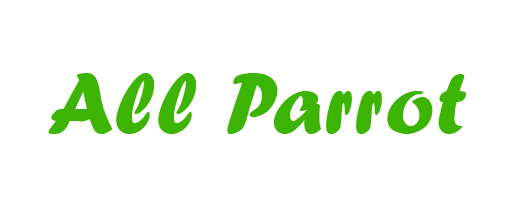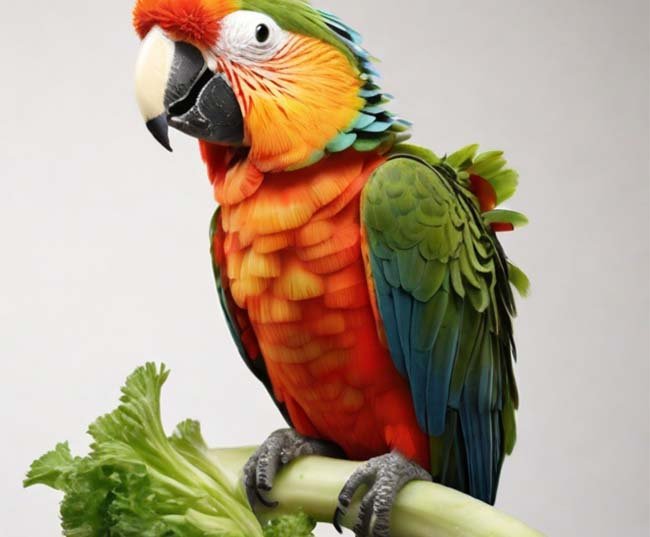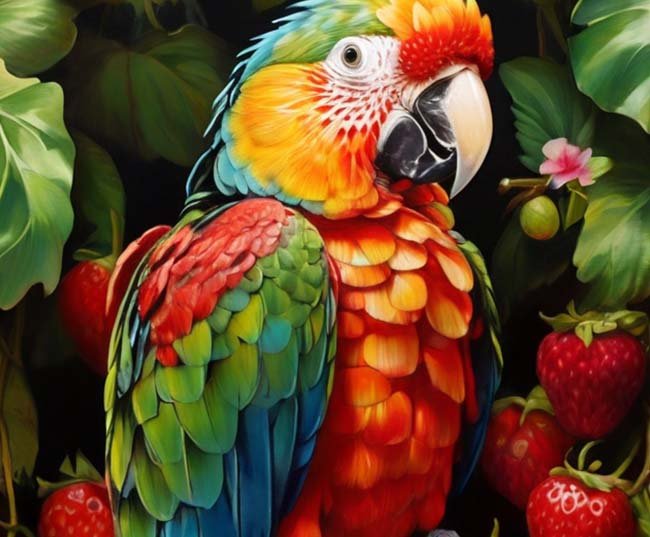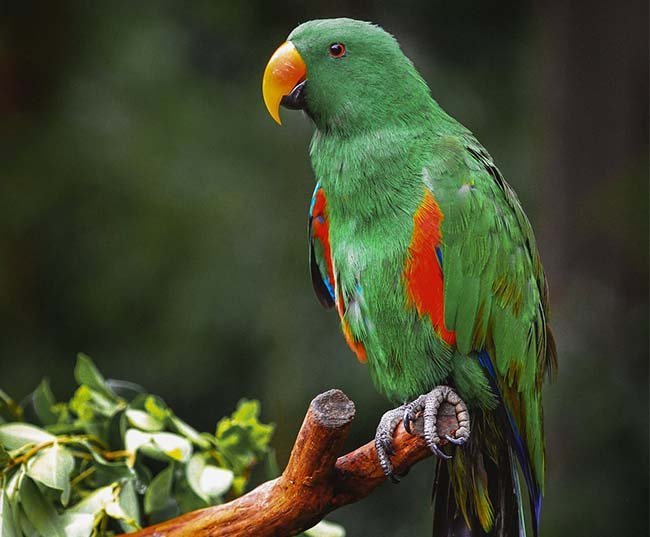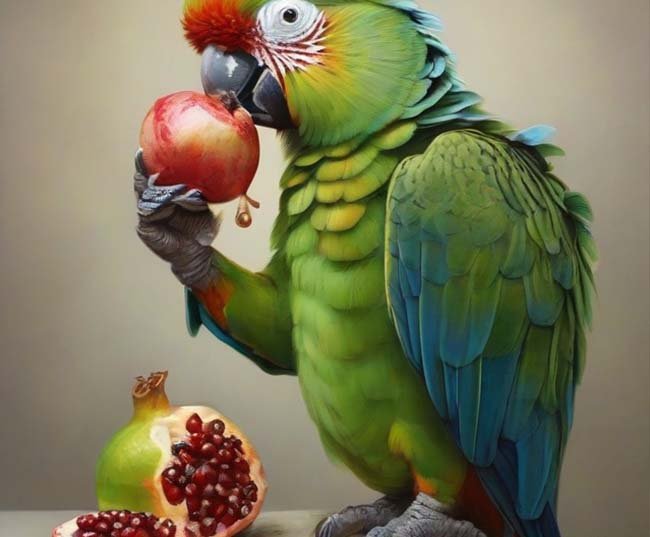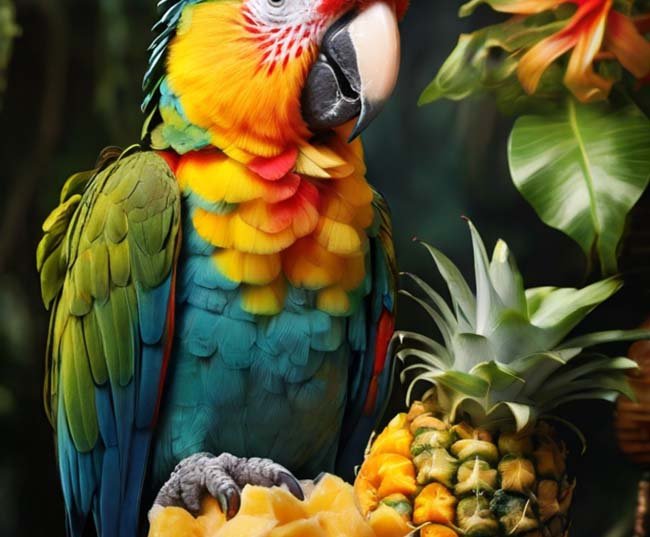Can Parrots Eat Apples? A Complete Guide
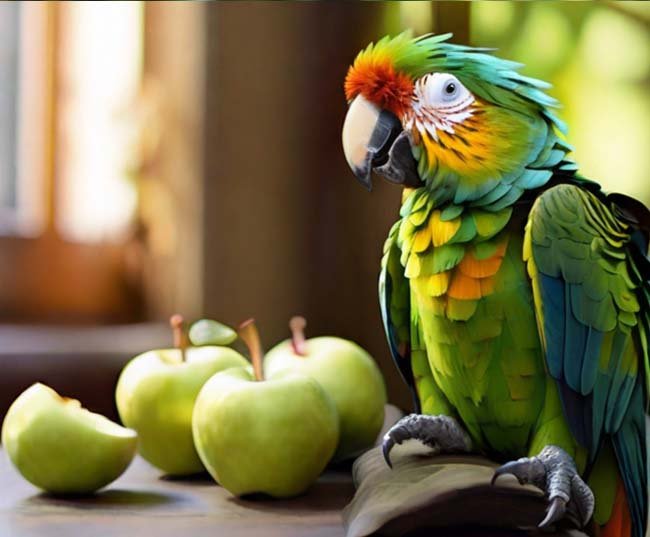
Apples are one of the most popular fruits, enjoyed by humans for their sweet, crunchy flesh and array of health benefits.
But can our avian friends also partake in this delightful treat? As a nutritious, natural food for many animals and pets, owners rightly wonder if apples make a suitable addition to a parrot’s diet as well.
This complete guide covers everything parrot owners need to know when it comes to feeding apples to their feathered companions.
We’ll explore the nutritional components that make apples healthy for some parrots while understanding the risks and downsides to be aware of too.
You’ll also find apple serving suggestions, guidelines on amounts to feed, advice tailored specifically to baby parakeets, and plenty of handy alternatives for picky parrots that turn their colorful beaks up at these fruits.
Let’s get cracking and see if apples can be a welcome treat and even a dietary staple for your parrot!
Key takeaways:
- Apples are generally safe for most parrots to eat in moderation. However, seeds and stems should be removed as they contain trace amounts of toxins.
- Apples provide beneficial nutrients for parrots including fiber, vitamin C, antioxidants, and minerals. These support immune health, digestion, bone strength and more.
- Best practices for serving apples include washing thoroughly, chopping into bite-sized pieces, monitoring for new food reactions, and only feeding fresh portions free of rot or damage.
- Certain parts of apples should not be fed – seeds stems, core, leaves, rotten portions. These either pose choking hazards or may harbor toxins.
- Feed apples in limited quantities 2-3 times per week at most. Larger amounts risk obesity and other health issues in susceptible parrots.
- Baby parrots should wait until 12 months old before eating apples to allow digestive system development. Offer tiny portions at first for weaned chicks.
- Apples make an excellent occasional treat, but commercial bird diets should still comprise the main staple long-term due to more balanced nutrition.
- 8. Signs of an apple allergy can include changes in droppings or feathers, diarrhea, lethargy or obsessive plucking. Discontinue apples if any of these arise.
- 9. Many other fruits make great alternatives to delight parrots including tropical options like mangoes, berries, pineapple, melons and more. Introduce slowly.
Can Parrots Eat Apples? Explained
Yes, parrots can eat apples, but remove the seeds first (toxic) and wash the peel (potential pesticides).
1). Are Apples Safe for Parrots?
The quick answer is yes, apples are overwhelmingly considered safe and healthy for parrots in moderation.
That said, there are some important safety notes and exceptions to consider before freely offering apple slices to your feathery friend.
Most parrots can safely enjoy apples due to their fiber and nutrient content.
However, apple seeds contain trace amounts of cyanide that may be harmful over time, so cores should always be avoided.
Too much apple can also negatively impact some smaller parakeet breeds prone to obesity and related issues.
For larger parrots like macaws and Amazons, the natural sugars found in apples make for an excellent treat and bonding opportunity with owners.
Just be sure to introduce new foods slowly and watch for signs of an allergic reaction when feeding any fruit or veggie, apples included, for the first time.
2). Nutritional Benefits of Apples for Parrots
So why are apples considered a healthy snack for parrots? Their nutritional profile explains it – when served properly, apples make for a fiber, vitamin, and mineral-packed bite that complements most parrot diets.
Details on the most notable nutrients and related benefits are broken down below.
Fiber
Like humans, parrots benefit tremendously from fiber, which promotes healthy digestion and waste elimination.
Apples are rich in soluble pectin fiber that assists with these critical bodily functions that are sometimes lacking in seed-only diets. Owners of constipated birds take note!
Phytonutrients
The natural plant compounds found in apples have been linked to improved immune response in people.
While research is limited on their direct effects on parrots, antioxidants like flavonoids and polyphenols are believed to boost their health similarly through these vibrantly-colored fruits.
Vitamin C
This famous immune-boosting vitamin abounds in citrus fruits, but apples are also a decent source.
Supporting white blood cell production with Vitamin C helps keep your parrot’s immune system humming.
Minerals
Apples also provide dietary magnesium, potassium, phosphorus and calcium.
Minerals enable diverse essential bodily functions in birds, from bone strength to enzyme reactions and oxygen circulation.
The particular mineral levels may complement gaps resulting from a seed-heavy diet.
Natural Sugars
While excess sugar is unhealthy for parrots, the natural fructose levels in apples are generally fine for most breeds.
Enjoyed in moderation, the fruit sugars offer quick energy and satisfaction for foraging pets – without the guilt of actual candy!
3). Best Ways to Serve Apples to Parrots
Now that we know the array of good stuff inside these crunchy fruits, how do we serve them to parrots safely?
Proper preparation and presentation are key when putting apples on the menu for your feathered diners.
Here are some top tips:
Wash thoroughly
This goes for any human food offered to bird companions. Pesticides or contaminants are a major risk, so always wash apples thoroughly before preparing them for your parrot.
Remove all seeds/stems
Apple seeds contain trace cyanide compounds that can become toxic over time. As well as taking out the core, you’ll want to remove any seeds and stem remnants before feeding apple slices.
Cut/dice appropriately
Bite-sized pieces are best for smaller breeds like parakeets so they don’t get choked or overwhelmed. No more than 1/2 inch cubes for big parrots.
Slices work nicely too. Quartered works great for larger beaked birds like macaws.
Monitor new foods
When trying a new fruit or veggie, observe your parrot closely for the first 24 hours. Allergies or intolerance will show fairly quickly.
Discontinue the new food if any concerning symptoms arise.
Avoid spoiled portions
Any brown or bruised apple sections are magnets for bacteria and yeast build-up. Stick to feeding your parrot only fresh, undamaged apple portions.
The same goes for any leftovers after an hour or so.
4). Apple Parts to Avoid Feeding Parrots
It’s just as crucial to know what apple elements should be avoided alongside how to serve healthy portions safely.
As natural foragers always looking to indulge their beaks, parrots will nibble on anything. Here’s what needs to be off-limits:
Seeds/pits
Apple seeds or pips contain trace amounts of cyanide compounds in their outer casings which become toxic over time. As few as 5 crushed seeds could cause toxicity.
Leaves/stems
Apple stems, leaves and smaller offshoots can be toxic. Certain organic pesticides applied on trees may still be present as well. Err on the safe side by not allowing contact.
Core/woody portions
The fiber-dense core of apples has tough, woody portions that can pose a choking hazard or prove hard to digest. Scoop out and discard the core before feeding apple slices.
Residue/dirt
Pesticides and contaminants pose major health risks to birds. Be sure to thoroughly scrub/peel apples to remove any dirt, chemical residue or yeast before serving.
Old/rotting sections
Bacteria and mold can grow rapidly on ripening fruit. Only feed your parrot fresh, clean portions of apple free of any brown spots or damage that allows contamination risks.
5). How Much Apple to Feed a Parrot
Everything in moderation applies to parrots eating apples too. The ideal amount differs by size and breed, but generally, apple slices should be limited as a garnish, snack or the occasional treat.
Here are some feeding guidelines:
- Large parrots – A couple of quartered apple slices 2-3 times per week make a fine addition to a balanced diet.
- Small-medium birds – Parakeets, conures, etc. can have a roughly 1⁄2” cube or 1-2 thin slices once or twice a week at most.
- Baby parrots – Focus on healthier staples while young. An apple bite once every 2 weeks won’t overwhelm their digestive systems as they wean.
- Monitor overfeeding – Owners wanting to offer more frequent apple treats should carefully track their parrot’s droppings and urates for signs of adverse changes indicating issues.
Consult an avian vet if concerned about the appropriateness of increased apple feedings for certain breeds prone to obesity or polyuria.
They’ll have specialized insights and recommendations for your bird’s unique needs.
5). Can Baby Parrots Eat Apples?
Baby parrots weaning from hand-feeding formula already face an adjustment period getting used to new textures and broader food variety on the path ahead.
Are apples an appropriate early addition while their young digestive systems develop?
Let’s look at key considerations around feeding apples to baby birds under one year old.
Digestive readiness? A baby parrot’s gut only produces the critical enzymes, good bacteria and digestive “hardware” needed to successfully process complex new foods after 8-12 weeks as they wean.
Introducing fresh produce too soon can overwhelm their underdeveloped systems.
Vets typically recommend waiting until after a year old unless digestive signs indicate readiness sooner. Slow and steady!
Ideal starter produce – For newly-weaned babies adjusting to fresh foods, there are better initial options than fruits and veggies.
Simple warm grains, leafy greens and sprouted seeds usually prove more tolerable first bites. Once established for a few weeks with no issues, then small fruit pieces can enter the mix.
Socialization benefits – Allowing baby parrots a small taste of the apple their owner is eating (before full weaning) offers positive socialization and bonding during a prime imprinting stage. Just don’t provide whole chunks on their own too early.
First apples – When baby birds are ready to give apples a first go, start with mere slivers or thin slices limiting contact with the skin. Monitor them closely afterward for several hours to confirm tolerance of this new treat.
Wean slowly – Hand-fed parrots should wean from formula gradually over 4-8 weeks, transitioning to increasingly complex fresh foods week-by-week.
There’s no rush – let your bird’s signs guide you when to advance through new diet introductions during this critical phase.
6). Apples as Treats vs. Main Food
Are apples better embraced sporadically as a fun, flavor-packed treat for parrots rather than a daily dietary fixture?
That really comes down to personal factors like your bird’s preferences, health conditions, size, and more. But generally, most birds benefit more from apples in moderation.
Here’s why:
Seeds/pellets still ideal – Most veterinarians advise commercial seed/nut and pellet mixes as the majority of captive parrots’ lifetime diets.
So richer fruits like apples provide added diversity in smaller portions, not staple fare.
Weight concerns – Alongside natural sugars, apples offer simple carbohydrates that can quickly convert to fat if overfed – risking obesity issues for some parrots. Moderation minimizes this threat.
Dental issues – Excess whole fruit chunks can prove difficult for some parrots prone to dental issues like beak overgrowth or mouth lesions.
Softer grains, pellets, greens and veg usually prove safer to eat routinely for these birds vs. large hunks of crunchy fruit.
Breed predispositions – Certain small, energetic types like lories and lorikeets thrive better on nectar-based diets overall.
Apples make more sense as sporadic nibbles over dietary pillars for high metabolisms requiring considerable natural sugars.
So view apples as delightful diversions from the mundane norm, but not the whole circus!
Offer sizeable slices or quartered portions a couple of times weekly at most for well-rounded birds to gnaw, nibble and shred their eager beaks on.
Just one feature among life’s many flavorful sideshows to keep their palates and routines fresh!
7). Alternatives to Apples for Parrots
Ah, but what about persnickety parrots that simply snub apples altogether? No worries – nature provides a vast bounty of tantalizing antioxidant-packed fruits beyond this single option to mix up mealtimes.
When apples fail to entice your feathered diners, try rotating in these nutritionally similar alternatives:
Other Fruits
Go tropical! Most parrots hail from exotic regions filled with juicy native fruits. Mangoes, papaya, kiwi, melon and pineapple usually prove instant crowd-pleasers.
Citrus fruits like oranges and tangerines offer Vitamin C too. Just forego citrus altogether for African greys—who may develop iron deficiency from too much.
Berries
Raspberries, blackberries and strawberries bring unique flavors minus excess sugars – and antioxidants galore!
Blueberries earn frequent flyer points for health perks from parrots too. Prepare all like apple slices—minus seeds and stems always.
Pomegranate
This vibrant ruby red tart-sweet gem adds gorgeous color to mix things up. Insides only – discard outer skin and divider walls which can cause stomach upset. Another antioxidant immunity aid!
Vegetables
Don’t overlook veggies either! Cooked sweet potato, squash and pumpkin offer similar benefits to fruits – with more fiber and fewer sugars.
The carotenoids birds convert to Vitamin A in many orange/red veggies support their immune function and vision too.
8). Signs of an Apple Allergy in Parrots
While most parrots relish apples in moderation with no issues, individual allergies happen, especially when introducing any new food.
Owners getting ready to share an apple treat for the first time should stay alert to potential indicators of an adverse reaction, including:
Changes in droppings/urates
Watery green stool, unusual coloration, lack of fecal portion, excessive rates or other extreme changes could indicate an apple disagreement.
Persistent diarrhea
Loose stools are common when adjusting to new foods, but extended bouts of watery diarrhea signal removing apples.
Lethargy
A moping parrot no longer eagerly mobile and playing may not feel well. Cease the suspect apples immediately.
Stained feathers
Luminous green staining around the vent area that fails to resolve also warrants investigation by an avian vet regarding apple-related irritation.
Plucking/self-harm
Allergic reactions can spark stressed behavior like obsessive feather-plucking. Another red flag to switch treats.
If concerning symptoms arise – or simply persist beyond 24 hours or so introducing apples – seek an avian veterinarian’s exam for specialized evaluation and care.
Catching food intolerances early vastly improves parrots’ long-term wellness outlooks.
9). Other Fruits Parrots Can Eat
Beyond apples, a diverse range of fresh produce brings vital nutrients and enrichment into parrots’ diets via foraging opportunities.
Here’s a quick guide to other popular favorites the whole flock can relish together:
- Melons – Cantaloupe, watermelon, honeydew melon. Provide occasional small pieces.
- Citrus – Tangerines, clementines and oranges. Sparingly. Avoid citrus entirely for African greys.
- Berries – Raspberries, blackberries, blueberries, strawberries. Only a few times weekly.
- Pomegranate arils – Ruby red seeds/pulp portions only. Discard outer skin and piths.
- Kiwi chunks – Many love this seed-filled tropical treat. Watch sugars.
- Pineapple bits – Pick ripe, natural pineapple. Never canned.
- Banana coins – Top favorite with nearly all species! Mash for babies.
- Mangoes & papaya – More exotic hits, often preferred over apples.
Always introduce new foods slowly to watch for any individual intolerances before freely offering.
And remember fruits complement balanced diets rather than strictly comprising them.
But the delights of sharing juicy, sweet apple nibbles or tropical mango morsels will keep you both returning for more satisfying bond-strengthening bites!
Frequently Asked Questions
Why shouldn’t I let my parrot eat apple seeds?
Apple seeds contain trace amounts of cyanide compounds in their outer casings. Consuming just 5-10 crushed seeds could cause toxicity over time.
It’s crucial to core apples and double-check no seeds remain before serving slices.
Can baby parrots eat apples?
Veterinarians typically recommend waiting until baby parrots are at least 12 months old before introducing fresh fruits.
Their digestive systems need time after weaning to develop the enzymes required to properly break down complex foods like produce.
How do I know if my parrot has an apple allergy?
Signs include watery green droppings, diarrhea persisting over 24 hours, lethargy, lack of appetite, stained vent feathers or destructive self-plucking.
If any reactions seem severe or don’t quickly resolve, seek an avian vet’s care immediately.
Should apples be my parrot’s main food?
No, seed/pellet mixes specifically designed for parrots should still comprise 60-80% of their long-term diets according to most experts.
Apples serve better as occasional flavorful treats 2-3 times per week supplementing their core nutrition.
What fruit can I feed parrots if they won’t eat apples?
Many parrots go crazy for tropical fruits like mangos, pineapple, papaya, berries and melons.
Citrus fruits work for some, but avoid offering citrus altogether to African grey parrots. Always slowly introduce new treats watching closely for tolerance.
